Premenstrual syndrome
-
Premenstrual syndrome (PMS) is a name for the changes in mood, and some of the physical changes, that happen to you in the days before your period begins.
Premenstrual syndrome (PMS) can affect your physical and mental health across the days leading up to your period.
The exact causes are complicated — but they have something to do with hormones like oestrogen, progesterone, and serotonin.
Lots of people get PMS. PMS is a big problem for some people.
-
-
What are the symptoms of PMS?
-
Some physical symptoms of PMS are:
- Sore breasts
- Headaches
- Pimples
- Tiredness
- Bloating (feeling like your belly is full)
- Diarrhoea or constipation (runny poo or not being able to poo)
- Sore or achy body
- Short term weight gain
Some mental symptoms of PMS are:
- Mood swings
- Anger or frustration
- Anxiety, depression, or sadness
- Hard to sleep
- Hard to concentrate
- Food cravings
- Avoiding friends or family
You might have some, or none, of these symptoms.
-
-
How we can help you
-
If your PMS is a problem, you don’t have to put up with it.
If you don’t want to have your period, some types of contraception can help you skip your period. Skipping your period helps you avoid PMS.
Book an appointment with us, and we can go over all your options. If you want to use contraception, we can get you a type that works for you.
-
-
How you can help yourself
-
There are some things that you can do that might make the days before your period better. None of these things will cure your PMS, but they might help.
- Eating small meals every 2-3 hours can help you keep your blood sugar even. Whole grain bread, brown rice, pasta, and cereals are the most helpful things to eat. Try not to eat lots of chocolate and sweets — the sugar causes uneven blood sugar.
- Drinking more water, and less alcohol and caffeine, will help. Eating less salt is good too. Cutting back on the amount you smoke or vape can also be helpful.
- Doing some exercise will often help you feel a bit better too. Try and include some activities in your day that help you feel calm, like breathing or relaxation exercises, meditation, or having a warm bath.
- Talking to friends and whānau about how you feel can make you feel more supported — and help them understand what you are going through.
If these steps are unhelpful or unrealistic, or if you would rather not deal with PMS or have a period, book an appointment with us.
-
-
